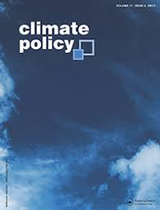External publications

Twenty years of climate policy: G20 coverage and gaps
Nascimento, Leonardo / Takeshi Kuramochi / Gabriela Iacobuta et al.External Publications (2021)
in: Climate Policy 22 (2), 158-174
DOI: https://doi.org/10.1080/14693062.2021.1993776
Open access
The number and coverage of climate change mitigation policies have increased in thepast twenty years, but important policy adoption gaps remain. To analyse sectoralclimate policy in the G20 over time (2000–2019), we compiled a dataset of climatechange mitigation-relevant policies and identified 50 key policy options thatconstitute a comprehensive sectoral climate policy package. Approximately half ofthese policy options are not widely adopted. Adoption is particularly low forpolicies that aim to: phase out coal and oil and mandate energy reductions inelectricity and heat supply; reduce industrial process emissions and incentivise fuelswitch in industry; design urban planning strategies for retrofits; and support theuse of renewable energy for cooking and heating/cooling purposes in buildings.Policies to remove fossil fuel subsidies and support carbon dioxide removal alsoneed substantial improvement. However, many policy adoption gaps exist as thecoverage of at least one policy option could be improved in each sector. Policy adoption gaps leave at least one-tenth of the G20’s emissions completely uncovered. Filling these gaps is fundamental to realize the full mitigation potential of existing policy options and to advance the transition towards global net zero greenhouse gas emissions.
Key policy insights:
- Mitigation-related policy options can be presented as a matrix by sector to shedlight on what constitutes a comprehensive climate policy package; looking across sectoral climate policies helps to unpack and clarify the status of adoption.
- Policy adoption gaps exist in all sectors. Increasing the sectoral coverage of climate policies will help to ensure that all relevant sectoral emissions and mitigation areas are considered in national mitigation efforts.
- Even if an increase in policy coverage alone does not ensure emission reductions,the absence of policy coverage indicates that emissions can still be further reduced and that a portion of global emissions remain uncovered by policies.
- Despite the observed increase in the number and coverage of climate policies,slow progress towards reducing global emissions and meeting the collective Paris climate goals calls for more comprehensive climate change mitigation policies. Filling policy adoption gaps presents a concrete strategy to improve sectoral, national and global climate policies.
Contact
Cornelia Hornschild
Publication Coordinator
E-mail Cornelia.Hornschild@idos-research.de
Phone +49 (0)228 94927-135
Fax +49 (0)228 94927-130
Alexandra Fante
Librarian/ Open Access Coordinator
E-Mail Alexandra.Fante@idos-research.de
Telefon +49 (0)228 94927-321
Fax +49 (0)228 94927-130



![[Translate to English:] Photo: Alexandra Fante, Bibliothekarin/Open Access-Koordinatorin](/fileadmin/_processed_/f/0/csm__c_Deutsches-Institut-fuer-Entwicklungspolitik_Fante_94ce4fa1ba.jpg)